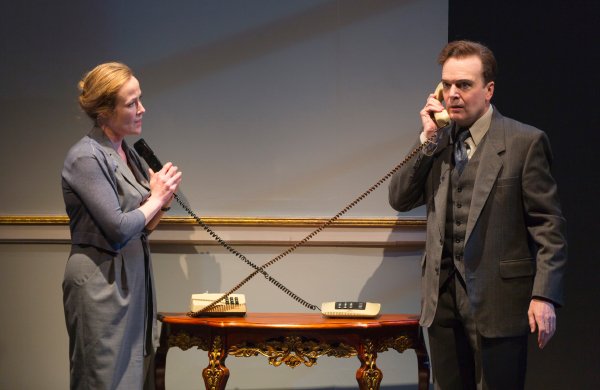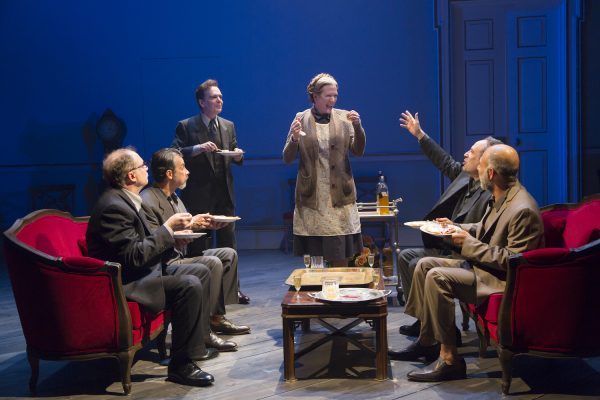
Mona Juul (Jennifer Ehle) and Terje Rød-Larsen (Jefferson Mays) try not to get their signals crossed in Oslo (photo by T. Charles Erickson)
Vivian Beaumont Theater at Lincoln Center Theater
150 West 65th St. between Broadway & Amsterdam Ave.
Tuesday – Saturday through June 18, $87-$147
212-362-7600
www.lct.org
In 1993, unbeknownst to the rest of the world, a Norwegian couple reached out to Israel and the Palestine Liberation Organization in an effort to foster peace in the Middle East. The clandestine back-channel talks, which led to the historic and controversial Oslo Accords, are dramatized in J. T. Rogers’s gripping play, Oslo, which has seamlessly moved from Lincoln Center’s downstairs Mitzi E. Newhouse Theater to its Broadway venue, the Vivian Beaumont. The always excellent Jefferson Mays stars as sociologist Terje Rød-Larsen, the head of the Fafo Institute for Applied Sciences, who sees such events as the tearing down of the Berlin Wall as an opportunity to facilitate the peace process between violent enemies Israel and the PLO. “My God, if Leningrad can revert to St. Petersburg, anything is possible,” he says. “Are you seriously suggesting Rabin talk peace with the man the Israelis call Hitler in his lair?” Norwegian foreign minister Johan Jorgen Holst (T. Ryder Smith) asks in disbelief. “Johan Jorgen, you don’t make peace with the people you have dinner parties with. You make peace with the people who bomb your markets and blow up your buses,” Larsen answers. Larsen is joined by his wife, Mona Juul (Jennifer Ehle), who occasionally addresses the audience directly, as a sort of narrator. “To clarify: Johan Jorgen is married to Marianne [Henny Russell], who works for Terje, who is married to me, who, as of tomorrow, works for Johan Jorgen. In Norway we take nepotism to an entirely new level,” she says with a smile. Larsen and Juul believe that by using “gradualism,” they can bring Israel and the PLO to the table, even though Israeli law makes it illegal for an Israeli official to speak with a member of the PLO.

Food and drink play key roles in negotiations between Israel and the PLO in Oslo (photo by T. Charles Erickson)
“This new model — my model — is rooted not in the organizational but in the personal, a process of negotiation allowing the most implacable of adversaries to focus on a single issue of contention, resolve it, then move on to the next single issue, as they gradually build a bond of trust,” Larsen explains. Secretly arriving in Norway are PLO finance minister Ahmed Qurie (Anthony Azizi), aka Abu Ala; official PLO liaison Hassan Asfour (Dariush Kashani), an avowed communist with an intense distrust of Jews; and Haifa economics professors Yair Hirschfeld (Daniel Oreskes) and Ron Pundak (Daniel Jenkins), who have been chosen by Israeli deputy foreign minister Yossi Beilin (Adam Dannheisser) to represent Israel in an unofficial capacity. Larsen and Juul put their plan into action, attempting to inject a positive attitude into the proceedings in order to get the negotiators talking. They are assisted by housekeeper Toril Grandal (Russell), who makes a mean plate of waffles, and her husband, groundsman Finn Grandal (Smith). Soon, despite their massive differences, Abu Al, Hirschfeld, Asfour, and Pundak are making progress, but without official acknowledgment from Israeli foreign minister Shimon Peres (Oreskes) and prime minister Yitzhak Rabin, the talks threaten to fall apart, until wildly unpredictable Israeli foreign ministry director-general Uri Savir (Michael Aronov) shows up.
Sociopolitical playwright Rogers (Madagascar, The Overwhelming) was introduced by director Bartlett Sher to the real Larsen and Juul following a performance of their previous Lincoln Center Theater collaboration, Blood and Gifts (which also starred Mays and Aronov), about diplomacy during the Soviet war in Afghanistan. Thus, Oslo is based on firsthand research, although Rogers points out, “To be clear, it is my version of this history.” Michael Yeargan’s set features a large backdrop with double doors through which the four negotiators often disappear; the audience is not privy to what is going on behind. In addition, huge images of Middle East violence are projected onto the wall. Together, the size of the wall and the videos make Larsen and Juul often appear small, which was the couple’s intention, as they saw themselves as mere facilitators, minor players in this major undertaking. Tony winner Mays (A Gentleman’s Guide to Murder, I Am My Own Wife) is outstanding as Larsen, balancing fear and excitement as he puts himself out on a limb in trying to accomplish the seemingly impossible. Tony winner Ehle (The Coast of Utopia, The Real Thing) excels as his equal partner in this dangerous venture, the unseen backbone ostensibly serving as an amiable hostess and direct liaison to the audience. Despite its nearly three-hour length, the play flies by, with Tony winner Sher (South Pacific, The Light in the Piazza) keeping things moving at a smooth police-procedural-like pace. Rogers’s script melds the comic and the surreal, the serious and the wacky in translating this most unlikely of scenarios into an utterly gripping yet tenderly intimate tale. Of course, nearly a quarter-century later, peace is still a pipe dream in the Middle East, and the theory of gradualism has not exactly taken hold in international diplomacy. But for a fascinating moment in time, two Norwegians offered more than a glimmer of hope, something the world can use a whole lot more of.